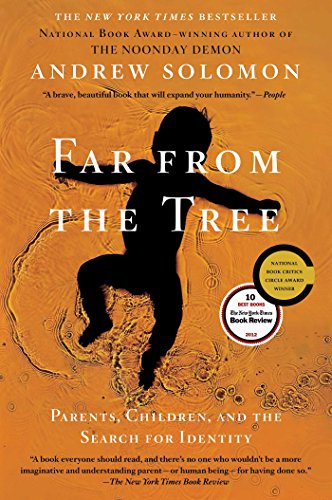Far from the Tree: Parents, Children, and the Search for Identity

Shortly after Andrew Solomon’s book, Far from the Tree: Parents, Children, and the Search for Identity was published (2012), I happened upon his TEDTalk, “Love No Matter What.” In the talk, he reviewed some of his key findings from the 300-plus families he interviewed. After hearing it, I immediately got a copy of his book.
At nearly 1,000 pages, Far from the Tree was a bit intimidating but it was well worth it. In his book, Solomon explores vertical and horizontal identities – vertical identities are the highly salient identities that parents and children share, while horizontal identities are those that they do not share and that prompt children to seek, outside of their parents and family, a community of similar others – and how parents react to, adapt to, and accept their children who are seemingly so different from them.
I found the book deeply informative and inspirational. Now an official Solomon fan, I found a couple events in the DC area that he would be at. So back in fall of 2013, I found myself on the campus of Gallaudet University to listen to him give a book talk. Now, after reading the book, you would think that Gallaudet stood out to me, but it didn’t. For those of you who aren’t familiar with the University, or for those who, like me, forgot, Gallaudet was the first school established for the advanced education of the deaf and hard of hearing.
So, hearing Andrew Solomon talk at this pivotal and historic institution about his book that was spurred by an article he wrote about the deaf community was quite an experience. I must admit, though, since I don’t sign, I was a little bit nervous being on Gallaudet’s campus.
I found my way to the Kellogg Conference Center, where the talk was to be held, with no problem. The auditorium filled slowly and then reached capacity. As the room full of students, professors, and administrators waited for the talk to begin, conversation filled the room. A flurry of signs abounded, and though I was in the midst of all this chatter, I was not privy to the conversations. I was able to pick up on a few pieces of conversation here and there, but for the most part I felt slightly out of place. Though we may come in contact with people different from us, we (unfortunately) typically stay within our own communities of similar others. So, to be in a setting where I was the outsider was a reminder that my perspective and my community is only one of many.
During the Q&A session, Andrew Solomon said, “One of the goals of the book was to make these cultures more accessible.” Through his exploration of almost a dozen horizontal identities, among them deaf, dwarfism, down syndrome, autism, schizophrenia, transgender, and more, I became so much more aware of and informed about these different cultures. A chapter is dedicated to each identity. In each chapter, Solomon gives the historical and social background of the ‘condition,’ including policy and laws that were enacted in response, technological or medical advances if applicable, and mainstream social or cultural understanding. Also included are excerpts from parent interviews and Solomon’s own observations of the different communities.
Interviews with over 300 families and years of writing and research culminated with this must-read book that has undoubtedly generated constructive conversation about parent and child relationships, identity, and these communities highlighted, in particular.
PAIR IT WITH a strong cup of coffee, maybe a bean from MokaOrigins, and a box of tissues!